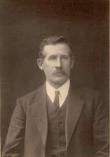John McDougall, politician, farmer, poet and Labor propagandist, was the eldest child of Donald McDougall who came from Scotland and selected land at Maroona (Victoria) in the 1860s. John's mother Margaret (née Keith) loved the work of Robert Burns and was remembered for singing his songs. John was educated at Rossbridge Common School but he left school at thirteen to help on the family farm. He married Margaret McGennisken in 1908 and they had a family of two sons and a daughter. McDougall was the first Labor Member for Wannon (Victoria) in Federal Parliament, between 1906 and 1913, and played a part in King O'Malley's launch of the Commonwealth Bank.
McDougall was a foundation and later life member of the Australian Poetry Lovers' Society in Victoria. He wrote for nearly fifty years, under various pen names, to publications including Labor papers. Much of his work appeared in the Tocsin (later incorporated in the Labour Call). At a meeting of the Henry Lawson Memorial and Literary Society of Footscray on July 16, 1930, J. Bergin spoke about McDougall's poetry, claiming that it was not as well known as it deserved to be. Miller and Macartney include Old Squatter's Soliloquy (1922) in a listing of McDougall's works; however, this has not been traced and no mention of the title is made in the Australian Dictionary of Biography entry for McDougall.
McDougall gained attention during the 1919 election campaign when the Nationalists used reworded verses of his anti-war poem, 'The White Man's Burden' as evidence of Labor's contempt for the 'Digger'. One group of returned soldiers was so outraged that they tarred and feathered McDougall in revenge. McDougall's daughter Margaret Luers later refuted accusations made against her father, writing that he 'never at any time denounced the Anzacs; indeed as the verse in question was written and published in 1902, it could not possibly have referred to the Anzacs. There was no word or line that made the slightest reference to Australian soldiers. The Boer War had just ended, and the poet, in satirical language, described the holocaust and aftermath of such a war.' Luers's account of the incident is given in 'My Father: A Poet Against War' (Overland 74 (1979), pp. 43-44).
 3535922175438202975.jpg
3535922175438202975.jpg